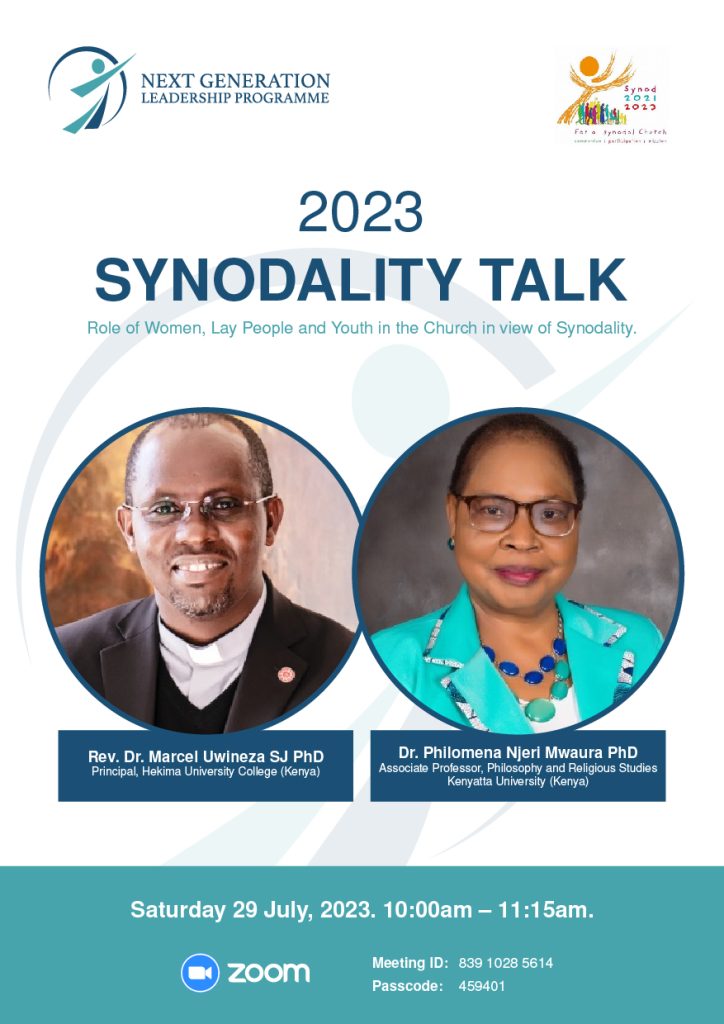The Importance of Embracing Synodality for a Flourishing Church
Recently, we organized a thought-provoking meeting on synodality, specifically on the role of women, lay people and Youth within the Church. The engagement was attended by NGLP board members, Alumni, continuing scholars from Kenya, Uganda and Tanzania and other stakeholders.
Dr. Philomena and Fr. Marcel Uwineza were the esteemed speakers who passionately shared their insights, emphasizing the significance of involving the laity and empowering women within the Church.
Dr. Philomena’s talk revolved around the crucial role of lay persons within the Church, drawing inspiration from the teachings of Vatican 2. The Church deeply values and recognizes the laity as an essential part of the body of Christ. Through the sacrament of baptism, lay people become integrated into the mystical body of Christ and are assigned apostleship by the Lord. They are viewed as individuals baptized into the Church, possessing secular traits that set them apart from the ordained clergy. The Church acknowledges and respects these distinctions, appreciating the diversity of gifts and talents among its members.
A fundamental call to the laity is the active practice of evangelization. Dr. Philomena emphasized that lay persons should not confine their spiritual duties to the confines of the Church but rather, take an exceptional form of evangelization beyond its walls. Engaging with the community, workplace, and society at large allows the laity to play a significant role in spreading the message of Christ.
To avoid a situation where the laity becomes mere spectators rather than active participants in the Church, systematic instruction in the functions and teachings of the Church is paramount. Equipping lay persons with comprehensive knowledge about their roles and responsibilities fosters a more engaged and involved congregation. Moreover, embracing synodality calls for attentive listening, enabling the integration of the laity into decision-making processes. By actively involving the laity in the governance and administration of the Church, a sense of belonging and commitment is fostered.
Fr. Marcel Uwineza’s presentation centered on the pivotal role of African women within the Church, using Rwanda as a case study. The devastating impact of the Rwandan genocide affected women profoundly. However, in the aftermath, women emerged as instrumental in rebuilding the nation. Despite facing significant challenges, they took up leadership roles and played a crucial part in shaping Rwanda’s future.
Drawing from Galatians 3:26-28, Fr. Uwineza called for greater attention to the experiences, status, and roles of women in the Church. Recognizing the plurality of women’s experiences and perspectives is essential in fostering an inclusive and equitable environment within the synodal Assembly work.
Yet, several obstacles hinder the greater involvement of African women in the Church. Issues such as clericalism and hierarchical decision-making structures need to be addressed. These challenges often limit women’s active participation in shaping Church policies and decisions.
Fr. Uwineza offered a threefold proposal to empower African women within the Church. First, listening to the stories and experiences of women is vital in understanding and addressing their unique needs and challenges. Second, providing adequate formation and empowerment opportunities for women can equip them with the necessary skills and confidence to take on leadership roles. Lastly, addressing fears within the clergy and promoting leadership formation among women will contribute to a more gender-inclusive Church.
The meeting provided a platform to reflect on the roles of lay persons and African women in the Church and the essence of embracing synodality. By actively engaging the laity and empowering women, the Church strengthens its foundation and paves the way for a more inclusive and dynamic community of believers. Recognizing the diversity of gifts and talents among its members and promoting active participation will undoubtedly lead to a more vibrant and purposeful Church.
Embracing synodality is the key to a flourishing future for the Church as it continues to evolve and adapt to the changing times.
